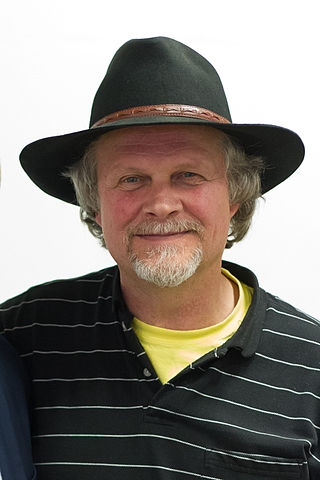Related Research Articles
The Christian countercult movement or the Christian anti-cult movement is a social movement among certain Protestant evangelical and fundamentalist and other Christian ministries and individual activists who oppose religious sects that they consider cults.

Apologetics is the religious discipline of defending religious doctrines through systematic argumentation and discourse. Early Christian writers who defended their beliefs against critics and recommended their faith to outsiders were called Christian apologists. In 21st-century usage, apologetics is often identified with debates over religion and theology.
Presuppositionalism is an epistemological school of Christian apologetics that examines the presuppositions on which worldviews are based, and invites comparison and contrast between the results of those presuppositions.
Edward Michael Bankes Green was a British theologian, Anglican priest, Christian apologist and author of more than 50 books.
Joslin "Josh" McDowell is an evangelical Christian apologist and evangelist. He is the author or co-author of over 150 books.

Shelly Kagan is Clark Professor of Philosophy at Yale University, where he has taught since 1995. He is best known for his writings about moral philosophy and normative ethics. In 2007, Kagan's course about death was offered for free online, and was very popular. This led to him publishing a book on the subject in 2012. Kagan was elected to the American Academy of Arts and Sciences in 2016.
Postliberal theology is a Christian theological movement that focuses on a narrative presentation of the Christian faith as regulative for the development of a coherent systematic theology. Thus, Christianity is an overarching story, with its own embedded culture, grammar, and practices, which can be understood only with reference to Christianity's own internal logic.
John Warwick Montgomery is an American-British lawyer, professor, Lutheran theologian, and author living in France. He was born in Warsaw, New York, United States. Montgomery maintains multiple citizenship in the United States, United Kingdom, and France. From 2014 to 2017, he was Distinguished Research Professor of Philosophy at Concordia University, Wisconsin. He is currently Professor-At-Large, 1517: The Legacy Project. He was named Avocat honoraire, Barreau de Paris (2023), after 20 years in French legal practise. He continues to work as a barrister specializing in religious freedom cases in international Human Rights law.
Christian apologetics is a branch of Christian theology that defends Christianity.
Edward John Carnell was a prominent Christian theologian and apologist, was an ordained Baptist pastor, and served as President of Fuller Theological Seminary in Pasadena, California. He was the author of nine major books, several of which attempted to develop a fresh outlook in Christian apologetics. He also wrote essays that were published in several other books, and was a contributor of articles to periodicals such as The Christian Century and Christianity Today.

The Testimony of the Evangelists, Examined by the Rules of Evidence Administered in Courts of Justice is an 1846 Christian apologetic work by Simon Greenleaf (1783-1853), an early professor (1833-1848) of the Harvard Law School.

Aristides the Athenian was a 2nd-century Christian Greek author who is primarily known as the author of the Apology of Aristides. His feast day is August 31 in Roman Catholicism and September 13 in Eastern Orthodoxy.

An apologia is a formal defense of an opinion, position or action. The term's current use, often in the context of religion, theology and philosophy, derives from Justin Martyr's First Apology and was later employed by John Henry Newman's Apologia Pro Vita Sua of 1864, which presented a formal defense of the history of his Christian life, leading to his acceptance by the Catholic Church in 1845. In modern usage, apologia describes a formal defense and should not be confused with the sense of the word 'apology' as an expression of regret; however, apology may mean apologia, depending on the context of use.

The following outline is provided as an overview of and topical guide to Christianity:
The following outline is provided as an overview of, and topical guide to, theology.
The courtier's reply is an alleged type of informal fallacy, coined by American biologist PZ Myers, in which a respondent to criticism claims that the critic lacks sufficient knowledge, credentials, or training to pose any sort of criticism whatsoever. It may be considered an inverted form of argument from authority, where a person without authority disagreeing with authority is presumed incorrect prima facie.

Cornelius Van Til was a Dutch-American Reformed theologian, who is credited as being the originator of modern presuppositional apologetics.
Jewish polemics and apologetics in the Middle Ages were texts written to protect and dissuade Jewish communities from conversion to Christianity, or more rarely to Islam. The terms polemics and apologetics may be distinguished but may also be considered somewhat subjective. A smaller number of proselytizing text also exists intended to convert Christians, or more rarely Muslims, to Judaism. However, the vast majority of Jewish polemical literature was written in response to Christian polemical writings and with a permanent reference to Christian arguments.

John Wayne Loftus is an American atheist author. He has written five books, and edited seven others.
References
- Alexander, Loveday (1999), "The Acts of the Apostles", in Mark J. Edwards; Martin Goodman; Simon Price; Chris Rowland (eds.), Apologetics in the Roman Empire : Pagans, Jews, and Christians, Clarendon Press, ISBN 9780191544378
- Dulles, Avery Cardinal (2005), "Apologetics in the New Testament", A History of Apologetics (second ed.), Ignatius Press, ISBN 9780898709339
- Milbank, John (2012), "Foreword: An apologia for apologetics", in Davison, Andrew (ed.), Imaginative Apologetics: Theology, Philosophy and the Catholic Tradition, Baker Books, p. 19, ISBN 9781441238771